#saint-just the representative on mission
Explore tagged Tumblr posts
Text
The vanilla slugs



Monk who just recently became of age to go on scouts earn his name for showing his pacifist spirit and using his early knowledge of the karmic world to find his brother. Even though he has received his title he is weaker then others his age, he makes up for it by teachin pups the karma system and insuring that they learn before they learn how to fight.
Survivor has also just earned his name from surviving on his own without much help and even helped an other slugcat with their own mission. He was separated from the colony when him and his peers went farther than they would suppose to be and got caught in the rain. He was found by his brother and a slugcat from metropolis.
Hunter a slugcat from far away and started living in the colony as of recently is the representative of the god NO SIGNIFICANT HARASSMENT and was on track to save an other god when he his a road block and needed help. Survivor found him and took him to an other god and kept him from moving while they waited for help. He was able to help the god in need (with survivor taking him to her) and his mission was completed.
DOWN POUR SLUGS


Gourmand a friendly slug who earned his name in a funny way by escaping as a pup (with his littermate) to get popcorn plant. His round nature allowed him the be an excellent fighter in hand to hand combat though a confrontation with the traveler hunter caused gourmand some grave injuries. Even though hunter injured him gourmand allowed the orange one in giving him the name hunter. He is now the representative of Unparalleled innocence
Artificer is the citizen of five pebbles she has given herself her current name when she was exiled from the clan after no one believed the young mother about scavengers killing her pups. Originaly she wanted to try and fix her relationship with her littermate and the scavengers but after realizing that even he didn’t fully believe her she snapped and started a genocide against all living thing mostly towards the kind that made her lose everything. She still hates anything and anyone who she has met with.
Ruffles and Spearmaster


Ruffles s the slight representative of LOOKS TO THE MOON he lives on her can (causing him to grow some fur) he’s mostly aquatic and despite his lone nature he has been known to be very sociable and is even friendly with the citizen of five pebbles. And has even found blueprints of most iterator puppets developing the tanks for the puppets
Spearmaster is a lone creature representing SEVEN RED SUNS. He is a slugcat to a degree though not all the slug cats are sure about it. Ruffles is the only one who thinks he’s fully slugcat and cause of ruffles not treating him to differently they have become very close to the point some think they are mates (ruffles acts like they are) Spearmaster is very skilled of somethings that ancients are good at (art and music)
Saint and ???


Saint is a lime slugcat who is at the edge of violence. He is ready to kill everything but for now no violence shall happen
??? Is a clown
The Saint and ??? story’s will be developed later
#rain world#rainworld art#rainworld au#rw au#rw Shiftin Storm Au#rainworld monk#rw monk#rainworld survivor#rw survivor#rainworld hunter#rw hunter#rainworld gourmand#rw gourmand#rainworld artificer#rw artificer#rainworld rivulet#rw rivulet#rainworld spearmaster#rw spearmaster#rainworld saint#rainworld enot#I need tumblr to just let my Au tag be there#the old one is there#ima use it if the Au tag doesn’t work
50 notes
·
View notes
Text




~ Batman: Knightfall
This is SUCH an interesting moment, I love it. Where to start?
Maybe on the fact that it reveals that Jean-Paul sees Bruce as a father-figure, and even wishes he was his actually father? "But he says he never thought of him as a father!" Have you seen how many suspension points are used? It shows hesitation, uncertainty, and also fear. Jean-Paul is seeing his dead abusive father and he is scared as said-father gets mad that Jean-Paul dares to follow another man's legacy instead of his. But remember: this is a hallucination created by Jean-Paul's mind, it is not real.
Jean-Paul's hallucinations are a reflection of his own feelings. Saint Dumas is his desire to be worthy of the Bat mantle and the mission Bruce trusted him with. His father is his guilt about his feelings toward his father, a man who raised him and he loved but now knows was abusing him and took his autonomy from him. It's a very commun feeling in victims of parental abuse at the beginning of their journey, and it is amplified here by Jean-Paul's schizophrenia. His guilty is personified by the ghost of his father berating him for prefering to follow Bruce over him, the man that raised him. Berating him for thinking of Bruce as a father over the man that abused him. It's his own mind pointing it out to him. So yeah, Jean-Paul does see Bruce as a father figure, because even tho he barely interacted with him, Bruce is kind of the "good version" of his dad, a man that raised his kids to fight evil but in the goal to protect, not to kill, and who didn't took their autonomy from them. Also, Saint-Dumas represents the ideology his father bequeathed to him, but in his mind, Saint-Dumas' ideology is Bruce's, not his actual father. It is filling the same role, but it changed the "father" he was following.
It is also such a horrifying hallucination that Jean-Paul is having. His father is killed by Saint-Dumas, which will just amplifying Jean-Paul's guilt about his feelings toward his father, and he turns into a skeleton as he burns. Jean-Paul's schizophrenia is harming HIM more than others, he is having an awful time. And when he hurts others, it's not because the hallucinations told him to (even tho that's what his father's vision is doing), but because he was trained since he was a baby and he is struggling fighting the brainwashing.
#batman#jean paul valley#bruce wayne#batfam#dc comics#knightfall#my ramblings#the whole “jean-paul sees bruce as a father figure” is also present in hks interactions with dick later on#it's so fucking good because dick is envious of jean-paul and jean-paul is envious of dick all because they want bruce's trust#and like jean-paul is still envious of dick in later comics he is envious of not being Batman's first son#the golden son if you must#it's not everyday that comics make me go “the writers cooked some good shit here”#but the parallel between dick and jean-paul makes me do it#they cooked
35 notes
·
View notes
Text
FIC REC WEEK 21 – ULTIMATES
A Hundred Times, Once by FestiveFerret, SirSapling
Pairing: Steve/Tony Rating: E Words: 24,761 Tags: Time Loop, Internalized Homophobia, Falling in Love
Summary: The shrill tone of his SHIELD beeper pulls Steve out of sleep and into battle. He fights robots, he fights Tony's shameless advances, he fights the exhaustion that threatens to take over him, drown him. And then the next morning, he wakes and does it again. Exactly the same. And again. And again. And again.
Reasons why I love it: Poor Steve, oh my god. I really love how the focus of the fic – in a reflection of Steve's mindset – goes from being about the Ultimates and their battles to Steve's fixation on Tony specifically. The way their relationship builds feels so raw and almost painful before it gets easier, and I love every second of it. Plus, the smut is incredible. If you haven't read this one yet, you definitely should!
Every Chance We'll Have by magicasen
Pairing: Steve/Tony Rating: M Words: 16,835 Tags: Secret Marriage, Hospitals, Established Relationship
Summary: A mission gone south leaves a city block decimated and Iron Man hospitalized, but what makes top headlines is the fact that Captain America has a secret lover. To the man himself, it's a living nightmare. His husband is in a coma, his entire world is falling apart around him, and Steve has to to confront realities he never wanted to.
Reasons why I love it: Yeees, give me all the feels! I love the flashbacks of how Steve and Tony got together, and all the scenes that touch on the topic of Tony's cancer are incredibly heartbreaking. That conversation with Gail towards the end especially hit home with me. This fic is wonderful, and you should definitely read it!
Under God by isozyme
Pairing: Steve/Tony Rating: E Words: 40,185 Tags: Angst with a Happy Ending, Internalized Homophobia, Dom/Sub
Summary: “Captain America represents the values of our country. The recent allegations about his sexuality are specious and designed to smear an American icon. Captain Rogers regularly attends the Church of Saint Agnes and invites the citizens of New York to attend worship with him this Sunday, April 14th. God bless America.” -- Nobody was ever going to know. Steve would be a good husband, a good father, and he’d never give in to sin and touch another man. But Steve makes two mistakes, one after the other: he leaves two words out of the Pledge of Allegiance, and he doesn’t notice a camera flash among the strobe lights of a dark club, because he’s dancing with his clumsy hands on Tony’s hips.
Reasons why I love it: Steve just completely breaks my heart in this one. The man-out-of-time feels are strong, and I absolutely love his inner struggles with not just his sexuality but his fragile masculinity. And oh my god, poor Tony, he really deserves better than this. I'm so glad Steve figures that out too at some point, because the heartbreak is almost unbearable, it's so good. isozyme writes some of the best Steve vs the Modern World fics, and this one is no exception. Go and read it if you haven't, it's amazing!
#marvel#stony#fanfic#a year in fanfic recs#fic rec#fanfic rec#fanfiction recommendation#ultimates#ults
57 notes
·
View notes
Text
The jacobins executed by Bonaparte

The plot of the rue Saint-Nicaise 24 december 1800 who kill 22 people and 56 injured
Warning:
As always I could be wrong as a history buff so feel free to correct me. Special dedication to @aedesluminis without whom I would never have been able to have so much information on Bernard Medge.
Alexandre-Joachim Chevalier
It is frustrating to have so little information about the Jacobins executed by the First Consul Bonaparte. Among them was the artificer Alexandre-Joachim Chevalier, arrested in December 1800 before he and his group could kill Bonaparte. He was executed on January 11, 1801, along with Veycer, who had not manufactured the infernal machine of Saint Nicaise (even though they had intended to kill Bonaparte). When he learned he was condemned to death, he reportedly shouted "Long live the Republic" but was immediately taken away by the gendarmes.
According to the author Jean Louis Vissières, though this should be taken with caution, as this book imagines what Alexandre Joachim Chevalier might have said if they let him talk after he learned the death sentence , this man worked in Year II at the artillery workshop in Meudon to improve the weapons intended for the soldiers of the Republic. Outraged by the Coup of Brumaire, he became part of a group of Sans-Culottes opposed to Bonaparte, including Desforges, a former member of the Cordeliers Club; Juvenot, a former aide-de-camp to General Rossignol; Gombaut-Lachaise, an officer struck from the ranks by Bonaparte, who deemed him excessive; Didier, and others.
Fouché's police, comprising a large number of informers, quickly foiled the plot, and the group was arrested at the end of December 1800. Again, according to Jean Louis Vissières' book, it seems Chevalier knew he was convincing no one by asserting his innocence but amused himself by exasperating the police and magistrates. This strategy was all the more effective because it allowed him to deny the involvement of other Jacobins. For example, "You wrote on a piece of paper: I am going to kill Bonaparte." Chevalier replied, "It was just to try a pen. I wrote the first sentence that came to mind."
It seems that once incarcerated, he got along well with the royalists as companions in misfortune, given that they shared a common hatred for Bonaparte. This information should also be taken with caution, but it reminded me of the touching anecdote about the friendship that developed between Marie Françoise Goupil and Lucile Desmoulins (their husbands were enemies and they likely would have been too if not for the misfortune that struck them, allowing them to bond in the face of the horrific parody of justice that led these two women to their deaths).
Of course, it seems clear that he was involved in the plot to kill Bonaparte in reaction to Bonaparte's coup and the rise of dictatorship. However, it is important to note that he never built the infernal machine on Saint Nicaise Street as he was accused (the work of the royalists).
Bernard Medge
He was born on September 3, 1753, in Carcassonne. At 17, he joined the naval artillery in Toulon. In 1787, he was involved in a case of stealing a cup, experienced imprisonment, and left to establish himself as a tanner before rejoining the army in 1792. In 1793, Metge was appointed principal administrator by the representative on mission Richou, where he came into conflict with Roussel. During the Thermidorian Convention, while Roussel was rising in rank, Metge wanted to resume military life and sought a lieutenant's commission in the Gendarmerie, which was refused by the Committee of Public Safety and the Directory. His position was precarious, especially as he was now considered a soldier without regular leave and risked punishment as a deserter.
He came to Paris in November 1795 to assert his rights and grievances. He had not forgotten his goals regarding his military career.
In the winter of 1795-1796, Metge became increasingly politically left-leaning, engaging in public debates, particularly in pamphlets, including one printed by René-François Lebois, considered the New Friend of the People, titled "Dialogue between a Representative of the People and a Former Administrator." In this pamphlet, Metge criticized the Council of Five Hundred for disregarding citizens' opinions and appeared in a public hearing on the same day the Directory announced the discovery of the Conspiracy of Equals. Consequently, Metge was arrested upon leaving and incarcerated. He wrote to the Minister of Police, Cochon de Lapparent, asserting he had no connection with the Babouvists, was appalled by their ideals, and said, "Indeed, preach the sharing and equality of goods, and you will have the lazy."
In March 1798, he published his work titled "Project of a General Bank of Agriculture and Commerce." It was primarily addressed to "farmers, merchants, manufacturers, fabricators, bankers, and brokers." Here is an excerpt: "Guided by the example of trading nations, I thought the best way to lift commerce from the lethargy in which it languished was to provide all citizens, without distinction, the means to invest their funds advantageously, securely, and with honest profit without any risk; and to allow others to easily obtain the sums or advances necessary for the type of work or industry they practice, paying only the most modest interest" (page 1).
He praised free commercial contracts and insisted that the government should be independent of finances, aligning more with capitalism and liberalism, as Metge adhered to the Constitution of Year III. In August 1799, he once again attacked Sieyes (the first time being in 1796) and contested the validity of the election that allowed Sieyes to become a director. He wrote a pamphlet titled "Panegyric of Sieyes," which established Metge's notoriety but also marked the beginning of his downfall. He was considered one of the 34 anarchist leaders and was arrested along with the 20 deputies seen as the neo-Jacobin opposition faction on November 11, 1799, shortly after Bonaparte's coup, Sieyes, and Ducos.
For the fifth time, Metge was arrested on October 4, 1800. What sealed his fate was simply his opinion. He authored a text "The Turk and the French Soldier," which justified the Egyptians' right to resist Bonaparte and called for a new "Brutus." His printer, Delrue, was also arrested. Here is the incriminating excerpt from the text:
"The Turk: You French call us slaves, while you are so dull that you don't even realize you are a hundred times more enslaved than us. In my country, a general who committed even a thousandth of the crimes Bonaparte has defiled himself with would have paid with his head... Where is the man who, knowing his rights and dignity, would want to live under such a government? Yet they dare to speak of liberty and equality; what a derision! Governments know well that they are dealing with fools and cowards, for there isn't a single Brutus.
The Soldier: There will be thousands.
The Turk: So be it."
This offense of opinion became conflated with the "Opera Plot" and the "Dagger Conspiracy." Consequently, Jean-Louis Humber, Denis Chapelle, and Etienne Jallabert were arrested for the opera plot. For the dagger conspiracy, Ceracchi, Arena, Topino-Lebrun, Demerville, etc., were arrested. Madeleine Fumey and Flamant were also arrested, with Flamant seen as dangerous by the police because, according to them, he was "the confidant of the conspiratorial leaders, and he was also responsible for printing and distributing pamphlets against the government at the Jacobins on Rue de Bacq."
The confusion was orchestrated by Fouché and Prefect Dubois, especially regarding Chapelle, who founded a secret society, and Metge. The case was handed over to a government commissioner, Gauthier-Biauzat, who was perplexed by the lack of material evidence for planning Napoleon's assassination. The accusation was based only on threatening words, polemical writings, meetings, and worse, there had been resort to torture—yes, torture. In addition to Bonaparte reinstating the punishment of branding, Fouché's police committed illegal acts of torture, rolling back reforms even Louis XVI had abolished. Despite threats from Fouché, Commissioner Gauthier-Biauzat, a scrupulous jurist, to continue to dissociate the cases.
Nevertheless, Bernard Medge was executed with two others, following this parody of justice on January 20, 1801, just after the arrest of the royalist François-Joseph Carbon, one of the main instigators of the Rue Saint Nicaise attack on January 18, 1801. Ceracchi, Arena, Demerville, and Topino-Lebrun were executed on January 30, 1801.
What is interesting about Medge is how political alignments shift over time. He was a neo-Jacobin, a fervent republican, an early opponent of Bonaparte, and an admirer of Brutus, yet clearly opposed to the Babouvists. Instead, he claimed allegiance to the Constitution of Year III. While his ideas appeared more conservative for a political class in 1793-1794 (even extreme leftists could be quite lukewarm on property rights), he is considered to belong to the left wing in the political class 1795-1799 and was classified as an anarchist by the Brumairians. In "The Turk and the French Soldier," we see another dimension of Medge: he can be interpreted as opposing expansionist and conquest wars, especially in defending the Egyptians, but also as glorifying the right to resistance.
My reflections and interpretations: To me, this is proof that Bonaparte was more deceitful from the start than even the revolutionaries in their worst moments. While we often, and rightly so, speak of the parodies of justice carried out by the Committee of Public Safety (CPS) supported by the majority of the Convention against the Enragés, the Hébertists, the Indulgents (although we often forget that Thermidor was not as bright, especially the execution of the last Montagnards like Charles Gilbert Romme, Goujon, and others), with very dubious amalgamations and sometimes fabricated evidence; in popular films, we only talk about the assassination of the Duke of Enghien (again, rightly so) concerning Bonaparte. Yet he committed far worse. As I said, although there were horrible figures during the French Revolution and the CSP committed questionable acts in an infernal internal and external situation to save the revolution, Bonaparte committed unforgivable acts in a much better situation just a month later, aiming to consolidate his power. Worst of all, he was a Jacobin And it truly took very little time for him to betray his former comrades—whereas the revolutionaries took longer to engage in internal struggles—for power. Not to mention the use of torture, an unforgivable act, and one abolished by Louis XVI. It is truly a step backward and more than unforgivable that Fouché's police practiced it on someone regardless of their convictions, whether royalist or republican.
Regarding the Jacobin Alexandre Joachim Chevalier, there was likely an attempt to murder Bonaparte. But didn't Napoleon himself say, "If I am treacherous, let all be Brutus," during the coup d'état? Wasn't he treacherous by betraying everything the French had given their lives for, and consequently, didn't the Jacobins have good reason to resent him? So, technically, he shouldn't be angry with the Jacobins who saw through his game from the start. Let us not forget that Medge was executed for the offense of opinion against Bonaparte. This demonstrates that ultimately, the 18 Brumaire was not as well-received as it seemed, whether by royalists or republicans.
The parodies of justice were worse under the CSP and led to the enactment of rather horrific laws: on January 5, 1801, without trial, 130 Jacobins were accused of complicity in the Rue de Saint Nicaise attack and were deported to the Seychelles without trial (including Felix Lepeletier), half of whom would die there (it was seen as worse than execution). Not to mention the arrests and detentions suffered by Marie Anne Babeuf and Simone Evrard after so much misfortune had already befallen these two militant women.
When it came time to draw up a list, Bonaparte called upon his former colleagues, the Septembrists. Did he forget that he was one of them (of the Jacobins, not the September Massacres) to deport them? Several state counselors said the assembly would never authorize this and that it had no competence. Talleyrand and Cambacérès then appealed to the Senate under "defense of the Constitution" measures as I understand it.
On February 7, 1801, the crimes of seditious assembly, rebellion, assassination, and brigandage became punishable by special tribunals; these courts did without juries and were not subject to appeal or cassation*. It was even worse than the justice of the revolutionary tribunal.
I strongly condemn assassination attempts, even against a figure I dislike as much as Bonaparte, for obvious moral reasons. If some Jacobins wanted to do it, it was the wrong way; even if they had succeeded, it would have opened the door to another dictatorship in my opinion. It was necessary to rally the masses again and start a new revolution. But I must point out that the movements were full of informants and often fabricated cases.
It is clear that Napoleon did not care whether they were truly guilty of the Rue de Saint Nicaise attack; he wanted to get rid of them, probably to further discredit Fouché in the eyes of the Jacobins (though Fouché needed no help in discrediting himself) and perhaps to provide assurances to the right and maybe tell his opponents, "This is what awaits you if ever…." In any case, he struck on all sides and eventually found himself alone, so when he really needed help, few allies were there for him (compared to Marat, who was arrested, and all of Paris rushed to his aid, or even when Robespierre, Saint-Just, Couthon, and Le Bas were arrested, 17 out of 49 sections wanted to help them without them asking for anything). Karma is harsh and finds its origin in this tragic affair, which would only be the beginning of a long list of grievances against him. Thats why I think Bonaparte didn’t care to save the revolution when he make the coup, it was above all for power.
I am not saying that Napoleon was a bloodthirsty man as often depicted by English propaganda. It is a black legend that needs to be combated, but I want to emphasize that while we often spend time condemning the acts of the revolutionaries (often rightly so, I am not absolving them), we exonerate Napoleon and his acts, which I believe were ten times worse.
Finally, I urge everyone who wishes to find more information about these Jacobins who were shot or died in deportation because it is always interesting to learn more about these forgotten figures of history and I can be wrong.
*https://www.napoleon-empire.net/chronologie/chronologie-1801.php
Sources :
Excerpt from Bernard Gainot's text Un itinéraire démocratique post Thermidorien Bernard Medge
32 notes
·
View notes
Text
In an issue of Historia magazine, Hervé Leuwers wrote an uchrony in which Admirat succeeds in killing Robespierre.
So, he shoot him twice in the Duplay's courtward. Everyone is in shock.
In the evening, Barère asked at the Convention to pantheonize Robespierre. Legendre isn't very happy.
The next day, they take him to the Panthéon, coffin open, Marat's behind.
After the shock, the rage explosed. A lot of people think it's the British fault. No more english and hanovrian prisonners. The Revolutionary Tribunal took tougher actions.
A few weeks later, the pressure drops. No one know if they need to continue or not. The CPS emerged weakened.
July 1794, only Barere and Carnot remains in the CPS. Prisons are open.
Lecointre criticizes Billaud, Collot, Couthon and Saint-Just for supporting exceptional measures and concealing the crimes of representatives on mission, such as Carrier. A few weeks later, Billaud, Collot, Carrier and other Montagnards were imprisoned, while the Girondins were rehabilitated. The Convention decided to exclude Marat and Robespierre from the Pantheon.
-----------
Me :

#doomed uchrony#what about Charlotte and Bonbon ?#did they work it out ?#frev#robespierre#saint just#barrere#marat#couthon#billaud#no respect for billaud#i hate you Barere#collot#carnot comes through as always
40 notes
·
View notes
Note
The best moments in the revolution (in your opinion)?
Desmoulins and Robespierre basically breaking up because the former used Rousseau against the latter in public after just having been mocked for his journal by him:
Robespierre: …I end by asking that [Desmoulins’] numbers be treated like the aristocrats who buy them, with the contempt that profanity deserves. I propose to the Society to burn them in the middle of the room (There is applause several times; Robespierre's speech was interrupted by applause and bursts of laughter).
Desmoulins: That's very well said, Robespierre, but I'll answer you like Rousseau: "To burn is not to answer."
Robespierre: How dare you still want to justify works that delight the aristocracy? Learn, Camille, that if you were not Camille, one could not have so much indulgence for you.
Pétion spending an excessive amount of ink insisting he did not get hard from sleeping in the same room as two stranger women while on the run from the authorities after the Insurrection of May 31 in his memoirs. Like, thanks for specifying Jérôme, but I never really thought that was a climate where such feelings grow in the first place…
There were two beds without curtains, two very dark little closets serving as wardrobes, a window overlooking the street, a small fireplace, and two or three chairs. So here I am, alone in a room with two young persons of interesting countenance, undressing myself, going to bed before them; then they get undressed and go to bed before me. I felt, I confess, these embarrassments of decency, which they no doubt felt even more than I did. But it was easy to see how much the generous action which they knew removed from their souls those ideas which might have troubled them. They did not even make any of those reflections which bring out the delicacy of the circumstance. I need not say that I did not allow myself any of these remarks, any of these jokes which could frighten the most severe modesty. I even confess that I experienced none of these sensations, none of these desires so natural that they are involuntary in the man whom nature has made truly man. I would have shamed myself if I had been tempted to abuse this touching hospitality. I was a brother with sisters.
Charlotte Robespierre arranging a meeting between Maurice Gaillard and Couthon so the former can plead for clemency for some people, eavesdropping to their entire conversation, throwing herself upon Couthon and holding him still once he (supposedly) makes a move to call for his body guards to arrest Gaillard, gets Gaillard to escape, makes Couthon ashamed over having attempted to ”immolate a friend that I had brought to his house,” goes and finds Gaillard and remains completely cool when he loudly asks her what the f she thought she was doing, answering that he would have been executed had she not intervened, that Couthon was only trying to deceive him and finally that he ought to flee Paris, something which Gaillard also agrees to do. Then years after the fact Gaillard recounts and records this anecdote for his BFF Fouché, only in this version, Charlotte’s identity is for some reason kept a secret and she’s only described as ”a lady.” Coincidence much…?
Camille getting smacked in the face with his latest number of Révolutions de France et de Brabant by a bookstore clerk, responding by saying he has a gun and could blow his offenders brain’s out, but simply opting for hitting him once with his cane.
Saint-Just playing with a rifle, accidentally firing a shot that almost kills his fellow representative on mission and then throwing himself in the guy’s arms in shock.
Robespierre being hypocrite 101 by expelling a member from the jacobins with the motivation: ”Brichet talks to you about this faction, but he does not name the individuals, he does not designate the traitors who must be punished. When revenge is demanded against representatives who are not named, the whole Convention believes itself threatened and exposed to great misfortunes. So the real traitors are those who put forward such motions.” Should have really taken your own advice there four months later, Max…
Louise de Kéralio-Robert exclaiming she will stab Danton if her husband doesn’t survive the Insurrection of August 10, alarming Lucile Desmoulins to the extent she keeps an eye on her for the entire rest of the night, a reaction that becomes much more understandable once you realize Louise had actually threatened three men harassing her with a knife just a week earlier…
The fact that a pamphlet with the name ”Conspiracy formed from 5 préréal [sic] by nine representatives of the people against Maximilien Robespierre, to stab him in the middle of the senate”exists.
Camille and Marat spending several pages of their public newspapers arguing because Camille got a word misprinted (”apostate” instead of ”apostolate”)
Not really the revolution, but all the times Napoleon is recorded to have lamented the fact he did not have Fouché executed.
The fact both Fouché and Robespierre seemingly each courted a girl and then contributed to getting two of her family members executed.
Françoise Hébert telling her accusers that she ”has never known her husband to be a conspirator, if he was he would have died by her hand,” during her trial.
Collot d’Herbois trying to defenestrate Robespierre, failing, and immediately trying to hug him as an apology.
79 notes
·
View notes
Note
Hi, thank you for your answer. The post i was alluding to before claims however that Carrier's recall letter and the recall letters of some other representatives in mission did not bear Robespierre's signature and that the recall letters of these proconsuls did not seem to take issue with their violence yet it seems to be an accepted fact even among hostile historians that Robespierre was against the behaviour of these representatives in mission. Is it because of their partecipation in Thermidor or are there other sources attesting to that?
So, to start, it's worth noting a couple of things:
1) As I've had occasion to mention before, it's not particularly indicative of anything which signatures a letter or decision of the CSP's bears, because despite internal disputes, there was a certain level of solidarity in those decisions and, on a practical level, there are often different drafts with different signatures, and often it's just a question of which ones happened to be preserved;
2) Recalls of representatives on mission almost never indicate the reasoning behind the recall, so it's not surprising that Carrier's doesn't either; however, in the CSP's letter to Prieur de la Marne, they do explicitly state that Carrier's "formes violentes" are among the reasons that they want Prieur to take his place. (Note as well that for both letters, we only have a draft, so we don't even know whether the signatures on the version that was actually sent are the same, and that while Robespierre's is not among the signatures on the drafts, despite their clearly coming from the same motivation, they don't have exactly the same signatures either: Billaud-Varenne and Barère signed both of them, but Jeanbon Saint-André and C. A. Prieur only one each.)
As I mentioned, though the signatures aren't really important. The key piece of evidence concerning Robespierre's involvement in Carrier's recall is the fact that he was recalled following a letter addressed to Robespierre in particular (Jullien's letter, that I mentioned previously). It's therefore logical that Robespierre would be the driving force behind the decision. Carrier's active hostility to Robespierre and participation in Thermidor is merely corroborative.
As I mentioned, as well, we do have a number of speeches of Robespierre's denouncing excessive violence and repression by representatives on mission in general terms, notably his speeches at the Jacobins in the lead-up to Thermidor and his final speech. Their advocacy for extending repression was also one element, among others, of Robespierre's rejection of the "ultras."
33 notes
·
View notes
Text
closed starter for @kywritesss (Sofia & Joel) date: August 28th 2019 location: in between Omerta and Athos, so at the south border of Athos. (here)
Saints had been dying like flies, out of reach and therefore of no use to the Delacroix family. They'd vowed to protect them, as much as possible at least, so they'd have to find the culprit, to kill them. Rumors spread about the four horsemen, about their powers, if they were real or not. Their darkness could've possibly infiltrated Omerta, forced humans to act out against Saints, just so there'd be less of them. In any case, Jean-Pierre deployed Sofia to Omerta for just a few days, just so she'd uncover the dark secrets their rivals tried to keep hidden from them. Not knowing the depth of their mission, Sofia decided to take one person with her. To remain hidden, within the shadows, while simultaneously looking for answers -- she could've dragged an Omerta native along or someone whose powers would be beneficial in deescalating situations. Joel Duncan. Jean-Pierre knew of his powers, the way they could work in their favor by forcing their enemies to sleep. Sofia would crush them, strike them down with lightning if she had to. A fruitless mission; One that would lead to a huge success if only they'd capture them to talk rather than silence them forever.
Standing at the edge in between Omerta and Athos, Sofia looked towards Joel, confused as to why Jean-Pierre wouldn't let her go alone. With no prior training together, no connections, she feared they'd not get along well enough to actually go on that mission. With her brows furrowed together, Sofia analyzed Joel's body language, tried to find anything that could potentially give away what he was thinking. Nothing. He seemed impenetrable, mysterious, but not in a good, exciting way. He represented that kind of mystery some would describe as unsettling, deep, unknown. Intriguing. His powers remained a mystery, especially to her. "He's supposed to work for the Parrino crime family. If our sources are correct, they've hired a Saint hunter for the sake of dragging them out of Athos, into Omerta, hoping to give them up as offerings to the four horsemen." Sofia huffed, just to release some of her anxiety and pent up energy. "We need to at least work together, not entirely trust each other, but... we need to work as a team. Can you do that? No casualties, no attention. We remain in the shadows, find the Saint hunter and drag them back to Athos."

8 notes
·
View notes
Text
Why doesn't the Church of Jesus Christ of Latter-day Saints build homeless shelters, hospitals, etc?
Because the Church doesn't duplicate infrastructure.
Why build an entirely new hospital when you can provide resources and volunteers to an existing one? (Note: they built Deseret Hospital, which was the predecessor to both LDS Hospital and Primary Children's Hospital in Salt Lake City)
Why build homeless shelters when it is far more effective to house the homeless instead with the same money?
Why create new charities when you can donate to existing ones?
People who use this line think they've found some clever Gotcha on a subject they don't know anything about.
Source: Me. I spent part of my mission serving at Temple Square. It includes Welfare Square, the hub of the Church's humanitarian aid program. It represents generations of the Church's investments into providing for those in need. The scope of what they do is so broad, I can't explain it all here. But the Relief Society innovated safe grain storage, which has gone into helping people in need for over a hundred years all over the world. Relief Society grain fed people after the San Francisco Earthquake, World War I, the Great Depression, and the Great Chinese Famine. The women of the Church created infrastructure where it did not exist, and it has been the backbone of the Church's humanitarian aid ever since.
The thing I most remember was the fact that they could get wheelchairs to people in the developing world for $4 a pop. They don't do any of that on their own. They do it in partnership with other organizations because it means they can help more people with the resources they give. The Church and its volunteers get less recognition that way, but that doesn't matter to us. It's the good deed done well that motivates my people, not recognition.
Why don't I care that the Church-owned ranches and farms are so large and valuable? Because that is where the food in the Bishop's Storehouses comes from. The Church grows and processes all the food they give away, functioning almost entirely on volunteer labor. There is a cannery right around the corner from my house where I've assisted in the Church's efforts to can peaches. Those peaches were grown on a church-owned farm. My congregation gets a cannery assignment, shared with all the other congregations here locally, to process food that feeds people in our community, whether they're active members of the Church or not. And ours is just one example of operations just like it that exist all over the world.
I've stood in the kitchens of Brazilian women who were preparing and storing rice to give away to people in need. The Young Women in my last ward collected donations to make hygiene kits to give away to homeless people. Wherever there are women in this Church, there will always be people finding ways to help people simply because they care.
Which is a reminder to my LDS friends who follow me: you don't have to listen to people who criticize the Church's generosity, especially when they're loud and wrong. Just start rattling off the ways you've seen the Church and its people do good where you are, or wherever you've been.
They probably don't remember Hurricane Sandy when it leveled New Jersey. But I do because my YSA congregation in Delaware had sign up sheets going around for months for volunteers to participate in the cleanup. They don't remember Hurricane Michael. But I do, because I was visiting family in the aftermath and saw all the roofs that were tarped by volunteers from my Church, members of that community in the Florida panhandle whose own church building was still in shambles.
Need a way to see all the good the Church is doing where you live? Go to justserve.org. It is full of volunteer opportunities in your local community, many of which are on there because of volunteers from the Church and the causes they're already involved in. I put one in the bulletin for my congregation each week. It's a better use of your time than entertaining out of pocket nonsense in your Asks from strangers on the Internet.
#mormon#lds#mormonism#tumblrstake#religion#faith#the church of jesus christ of latter day saints#queerstake
71 notes
·
View notes
Text
Because it is a shamefully wicked thing to strip the body naked at a banquet among the drunken and licentious, it does not follow that it is a sin to be naked in the baths.
St Augustine, On Christian Doctrine
Rereading Chapter 14 of Misericorde, and I've got a few thoughts about it.
1: 🤔
Look, I know Hedwig having trouble applying her encyclopedic scriptural knowledge is a running theme, but it's still very funny that Hedwig, embarrassed at the prospect of seeing Eustace and Moira nude, says "But what if I start having lustful thoughts? That would be incest!" and Eustace goes "You know 'Sister' is just a title, we're not actual blood relatives"
Also interesting how Moira makes such a bit deal out of Hedwig's black hair being a sign of melancholy, then acts like the only incongruous thing about her black hair is that she's Irish.
2: Uncleanliness and spiritual despair
One huge theme in this chapter is Hedwig's sense of unworthiness. First, when reflecting on her vision she thinks herself unworthy of having been given a vision, that while of course God is all powerful and all seeing, that maybe she is worth less than the lillies of the field and the sparrow that falls (incidentally I'm not sure what she means about Augustine's warning against allegorizing too heavily: her error here seems more like his warning not to misread rhetorical questions.)
Hedwig talks about "the indignity of the laundry water incident [being] something that would stick with [her] permanently". There's an obvious literal meaning of it being upsetting, but think back to her vision: the dog became sick after eating fritters soaked through with the laundry water. Whether the dog represents Hedwig or someone else, it's clear the laundry water is being associated with sin here (Proverbs 26:11, 2 Peter 2:22), either as sin itself or the actions of other provoking one to sin. Hedwig feels like even if she is washed clean, she'll still feel somehow tainted.
When getting Moira's clothes, Hedwig spills her ink, and feels unable to deal with it or tell Moira. She feels that there's no way Moira could forgive her for that. Fortunately Kumasawa uses finite magic to fix the bottle and put the ink back inside before Campy knocks it over again, but Hedwig still feels like even a clumsy mistake is enough to destroy her relationship with Moira.
And at the feast, Hedwig feels unworthy of being celebrated. She's the Mother Superior's spy, betraying everyone's trust by her very presence. Everything keeps coming back to a sense of worthlessness, contamination, and stain.
3: Saint Cecelia
This chapter (and the previous one) all occur on Saint Cecelia's day. Cecelia is patron saint of music, for having inwardly sung hymns during her wedding ceremony, and the portative organ is one of her attributes, but there's more to her story than that. After being married, she warned her husband that an angel stood ready to strike him down if he touched her, but he could not see it unless he was also baptised. He went out, was baptised and converted, and saw the angel which miraculously produced flower crowns for them. The two of them, and her brother-in-law, were condemned to death by a Roman prefect, and initially Cecelia was to be suffocated in the baths (I think locked into a room and heated up until she died) but no matter how hot it was she felt cool and comfortable. Then, she was to be decapitated, but despite being struck on the neck three times she survived another three days, preaching to crowd, before finally dying.
So baths, bodily inviolability, visions that only appear to some but not others, and outward appearances vs inner feeling. These all come up: Hedwig and Eustace argue about how Hedwig could have flown while the Farmer saw her walking, there's a bath scene in which Hedwig is concerned about her body being seen. And at the feast, while outwardly appearing happy, inwardly Hedwig was tormented with guilt and was always thinking of her secret mission from the Mother Superior, just as Cecelia outwardly looked a bride but beneath her dress mortified her flesh with a hair shirt and in her heart was always singing to God. I feel like there could be something there.
4: Surprise parties
I forget the exact episode number and context (presumably about foreshadowing?), but while talking about Cursed Child, Xeecee mentioned how easy it is to overtelegraph surprise parties (something like "Hey can you be out of the house 3-5, I'm cleaning all the floors or something, but make sure you definitely get back right at five. But not before! Five sharp!" yeah okay now I know you're doing a surprise party I'll pretend to be shocked). So I like how Hedwig, after saying that she'd like a nice prank like a surprise party, reacts to being brought into the rectory with "oh no I am going to be murdered!" Great to take a woman with 3 weeks total of socialization and just put her in situations.
5: The Bishop of Carlisle looks a bit like God, doesn't he?
I mean obviously he's a bearded man making a sign of benediction, that's going to do something, but God did look a bit fat in the vision.
I know some of these might seem like a reach, so in case any of you feel like criticizing me I'm going to leave you with the words of Saint Augustine of Hippo:
Thus, when one man says, “Xeecee meant what I mean,” and another says, “No, they meant what I do,” I think that I speak more faithfully when I say, “Why could they not have meant both if both opinions are true?” And if there should be still a third truth or a fourth one, and if anyone should seek a truth quite different in those words, why would it not be right to believe that Xeecee saw all these different truths?
#misericorde#misericorde vn#Of course Augustine wasn't expecting Moses to actually see his Confessions...
8 notes
·
View notes
Text
Rose Red | Morpheus x F! Reader

Warning: None
Notes: Happy Valentine’s Day! If you don’t have a valentine, I’ll be yours ❤️ Set in the same universe as, “Red Bow” but you can read it as a standalone! Inspired by the song, “Rose Red” by Emilie Autumn.
If you'd like to be a part of “The Sandman” tag list, just ask me! Requests are open.
Word count: 2.6k
Masterlist
After what happened on Christmas, you made it your mission to teach Morpheus human customs. Since Morpheus was aware of your fascination with human customs from the waking realm, he tried his best to keep up with your teachings. Morpheus felt like he was making great progress with learning human culture, and it was bringing the both of you closer. Unfortunately, you stopped teaching him human customs, after he lit a firework inside the kingdom and nearly blew Matthew into pieces for New Year’s Day. Ever since that day, you became distant from him, and when he would search for you, you would immediately walk away, stating you had a job to attend to. Due to your cold shoulder, Morpheus would spend time in the throne room, reflecting on himself and your time spent with him. “Boss, I think you can still make it up to her,” Matthew said while standing in front of Morpheus in the throne room. Morpheus was in the throne room, sitting on the stairs and sulking as usual. Matthew was knowledgeable of human culture and knew Valentine’s Day was today. He thought maybe Morpheus could give you chocolates and flowers for forgiveness and perhaps a date. Morpheus just side-eyed Matthew and continued to sigh. “Matthew, I nearly slaughtered you. I doubt I could make it up,” Morpheus said in a flat tone.
“Well, I already died once,” Matthew replied while tilting his head and flapping his wings, “What happens if I die twice? Will I continue to return as a crow or will I become a ghost?” Morpheus glanced at Matthew, who began to mutter to himself about the possibility of him becoming a ghost after he dies again while walking back and forth. Shaking his head, Morpheus stood up and began to walk up the stairs to look outside the window. The sunlight shone against his pale skin as he looked through to continue to think. Matthew flew to stand next to Morpheus and cawed. “I’m being serious, there’s a holiday today called Valentine’s Day.” Matthew explained, looking at Morpheus, “It’s a holiday where lovers spend the day together, you can give chocolates and flowers. It’s a romantic holiday!” Morpheus kneeled, facing Matthew, and raised his eyebrow. “Valentine’s Day? What does this Valentine's mean?” Morpheus asked. Matthew ruffled his feathers and began to think, trying to remember what you told him a couple of days ago. “Oh, it’s a holiday named after Saint Valentine who represents love.” Matthew answered and cawed, “I know you love her, boss.” Morpheus twitched a faint smile on his lips and shook his head.
“I love her very much, yet I ruined it.” Morpheus said in a sad tone, “Do you think she would accept my chocolates and flowers?” Matthew stared at him and nodded his head. “Of course! Everyone loves chocolates and I know just the flower that will make her swoon.” Matthew assured, he wagged his tail and began to fly out of the room, cawing for Morpheus to follow him. Morpheus immediately followed Matthew, and together they went out to the gardens. Matthew flew around the garden looking for roses while Morpheus walked around, slowly peeking his head around the bushes to see if you were around. To no avail, you weren’t in the gardens. Truly living up to your purpose as the dream that represents generosity, you would normally help Mervyn with the garden, but unfortunately not today. Morpheus sighed again in defeat until Matthew cawed on the other side of the garden. He quickly walked over to the other side of the garden to see Matthew standing next to a rose bush. “A rose bush?” Morpheus questioned while touching the rose petals, “Why a rose bush?” Matthew flew to land on the bird bath fountain next to the rose bushes and explained, “Red roses represent love, and I know (Y/N) loves red roses. I hear her sing the song, Rose Red all the time when working.” Morpheus looked to his right to see Mervyn holding a pair of flower shears, walking over to them. Mervyn smiles at Morpheus and then looks at the rose bushes. “Pick any of the roses,” Mervyn said while pushing some roses from the bush, “I’ll clip them.” Morpheus said a small thank you and began to look around the rose bushes to find the perfect bouquet for you. His hand would move the roses around, and point at the deep red roses for Mervyn to clip. After picking some of the roses out, Morpheus saw his hand was filled with small cuts, but ignored it. Mervyn walked away with the roses and said, “I’ll leave them in your chambers after I finish preparing them.”
Matthew cawed and said, “Our plan is almost complete, boss. We just need to get chocolates and convince her to meet us at Fiddler’s Green!” Morpheus and Matthew walked out of the garden to walk to the kingdom’s plaza. The plaza was filled with citizens walking around to finish their errands, talking, and negotiating prices. Some people were around the fountain playing live music with a couple of them dancing in a circle. Morpheus looked around to see if you were nearby, and with sheer luck you were. His eyes widened and his lips parted as he saw you dancing on top of the fountain rims singing to the song, Matthew mentioned earlier. You were beaming as if the sun was attached to you, and sang, “ Rose, rose red. Will I ever see thee wed? I will marry at thy will, sire. At thy will!” The citizens playing the instruments complimented your voice, as the others were dancing. Your hips were swaying to the live music and your eyes were closed to consume everything. “Tell me no more stories, and I'll tell you no lies.” You sang clearly and twirled around the fountain, “No one wants to hurt me, but everybody tries. And if you think that I've been waiting for my planets to align. It's time you go on!” Morpheus’ heart fell to the floor when he heard you sing the lyrics; it was as if the song was for him. A song for him to leave you alone, and he felt defeated. Matthew noticed Morpheus’ change of face and said, “It’s just a song she likes. She heard it when she was working on an artist’s dream. Come on boss, the store is near here.” Morpheus took one last look at you and walked away.
As the song was coming to a finish, you opened your eyes to see Morpheus walking by you. It took every ounce of your will to not rush to him and hug him, but you brushed it off to continue singing. But you knew you had to give him space, for your own sake. Ever since the incident on New Year’s Day, you became more work-focused because you realized it was a mistake on your part for Matthew’s near-death experience, and you should stop messing around; rather, focus on your main purpose. The work was supposed to keep your mind busy, but you would always find yourself thinking about Morpheus. Nevertheless, you never reconciled with him, although you planned to, you just never knew when. When the song finished, everyone clapped for your performance, and you got down from the fountain, crouching to grab your basket. You waved bye at everyone, and another person came up to start performing as well. It was a small practice you made in the dreaming realm, where the plaza should be filled with live music and performances to make the people feel more welcomed and happier. You decided to go to Fiddler’s Green for the day since it was Valentine’s Day in the human world, and eat a small meal next to the fish. Perhaps afterward, you would gather the courage to talk to Morpheus about how you feel. Regardless, you were going to spend the holiday alone; at least the fish down the river would keep you company.
Walking down the pathway to Fiddler’s Green, you opened your basket to make sure you had everything inside. Inside your basket, you had a red velvet brownie in the shape of a heart, a white wine bottle from the waking realm, and strawberries covered in chocolate. You made the desserts by copying them down from a baker’s cookbook when you went to the waking realm the last time. It took you two tries to get everything right, and you were happy you finally got to eat them. As you got near Fiddler’s Green, you didn’t notice you were being watched. In fact, by the time you sat near the river and began to pull out your dessert, Morpheus and Matthew were hiding behind a bush looking at you. “So, uh. Boss?” questioned Matthew, “I don’t know how it works in the dreaming realm, but in the human world, stalking is a crime.” Morpheus looked at Matthew and responded, “I don’t think I dare to walk up to her.” Matthew cawed and ruffled his feathers; he had to get Morpheus to walk up to you, but he didn’t know how. So, instead, he continued to examine you, eating strawberries while staring at the river. Matthew would look at Morpheus and see how in awe Morpheus’ face was. He shook his head and sighed, “Boss, you gotta walk up to her. Go! Or else, I’m telling her.” Morpheus stopped looking at you and looked at Matthew, “You wouldn’t dare.” Matthew cawed and knew what to do now. “Oh yes, I do.”
Matthew cawed and began to fly towards you, screaming your name. Morpheus nearly dropped the bouquet and chocolates when Matthew began to scream your name. “Oh, (Y/N)!” screamed Matthew while flying to you, “(Y/N), the boss wants to talk to you!” You looked up to see Matthew land on top of your shoulder. “What does Lord Morpheus want?” You asked while taking another bite of the strawberry. Matthew used his wing to point at Morpheus, who was awkwardly walking over. You could see he was hiding something behind his back, and his eyes were looking at the floor. Raising your eyebrow, you asked, “Lord Morpheus, what do you have behind your back?” Morpheus’ face turned a slight pink and he revealed what was behind his back. A bouquet of the reddest roses you ever saw in your life, with a box that you assumed had chocolates. Morpheus cleared his throat and said, “I’m sorry for hurting you. I didn’t mean to make a disaster on New Year’s Day. And…Happy Valentine’s Day.”
“That better not be a pity bouquet. Pity chocolate I’ll take, but that’s it.” You replied while standing up to inspect the chocolate box. Morpheus was taken aback as his eyebrows were raised and his lips turned into a frown. “I picked the roses. Matthew told me you love roses,” Morpheus whispered while looking at the bouquet. You began to laugh and shake your head. “Sorry, Morpheus. It was a cruel joke. I’ll take the roses as well. They’re so beautiful.”
“Not as beautiful as you,” Morpheus stated while looking at you with the softest eyes you ever saw. Your face began to feel hot, and you giggled at the compliment. Meanwhile, Matthew’s beak fell open and he cawed. You motioned Morpheus to sit down next to you and you opened your basket again. Matthew decided to sit on your shoulder and coo as you began to take out your brownies. Morpheus smiled at the sight of the brownies when you gave them to him. Matthew cawed and began to peck at the brownie from your hand. In silence, you ate the brownies together, and you also shared your strawberries with them. Morpheus would glance at you whenever you weren’t looking at him, and he would be amazed. Then, you decided to take out the white wine to drink; however, when you pour the wine into a cup, Morpheus asked, “Why does that look like a love potion?” Matthew gasped and said, “Are you going to bewitch him?” You began to laugh to the point, you nearly dropped the cup. Wiping the tears away from your face, you said, “No, it’s white wine. I assume you’re used to red wine?”
“I don’t drink,” Morpheus stated while inspecting the wine bottle, “Although, it smells lovely.” You gave him the cup and motioned him to take a sip. Since you only brought one cup, you shared the wine with Morpheus. Meanwhile, Matthew was dying of thirst, but he didn’t want to ruin the romantic moment you two were having together. Instead, he got off your shoulder and began to lay on a river rock staring at the fish. Occasionally, he would turn around and see the two of you talking and laughing. Matthew’s tail swayed in excitement and he hoped Morpheus would finally tell you how he feels. It was hard for him to keep quiet, but he tried his best either way.
“Morpheus,” You started to say, after taking a sip from the wine glass, “I’m sorry for being cold towards you and Matthew. It’s just that, after the incident, I freaked out. I wanted to forget about everything and focus on my work. But it was so hard. When I wanted to talk to you, my body would freeze and I couldn’t find the courage to talk to you. It’s also hard because all I could think about is…you.” You looked at Morpheus, who was staring at you and nodded in agreement. “I understand, (Y/N),” Morpheus admitted while slowly getting closer to you, “However, it’s best to reflect on the past, than dwell on it. At least, Matthew is still alive, and we’re talking. I also think about you…from time to time.” You smiled at him, and he returned the smile. Slowly, you held out your hand, and Morpheus held it. As you locked your hands together, he cleared his throat and whispered, “Rose, rose, rose red. I love you.” You smiled at him and began to laugh at his words. Morpheus furrowed his eyebrows until you explained, “That’s adorable. I guess Matthew told you my favorite song?” Morpheus nodded his head.
You leaned towards him, and Morpheus did the same. Tilting your head to the side, your lips brushed against each other. “Rose, rose, rose red. I love you too.” You whispered before closing the gap. The kiss was sensual, coming off slow and tender before transforming into a deeper kiss to the point your teeth clashed together. However, you broke the kiss after hearing Matthew caw and standing in front of you two. The two of you began to laugh when Matthew gagged at the sight of you two kissing. “Please, get a room next time.” Matthew said while covering his eyes with his wing, “My poor eyes…” You patted his head and apologized. After giving him a piece of strawberry, his tail swayed and his feathers ruffled in happiness. Morpheus stood up and let out his hand. “Come On, Valentine’s Day still isn’t over.” Morpheus said as he helped you up, “Matthew, you can clean up this mess, (Y/N) and I have some unfinished business to take care of.” You began to play with your hair when Morpheus winked at you before Matthew could say anything. Morpheus grabbed your hand to lead you back to the kingdom. Matthew was left alone, and he sighed at the sight of the mess.
“Well, happy Valentine’s Day to me too.” Matthew sighed before pecking at the leftover strawberries.
#dream of the endless#dream x reader#endless dream#dream x you#dream x fem!reader#dream x y/n#dream but the netflix one#the sandman x reader#sandman x reader#sandman imagine#sandman fanfiction#morpheus sandman#dream imagine#sandman x you#sandman x y/n#morpheus x reader#morpheus#morpheus x fem!reader#morpheus x you#morpheus x y/n#morpheus fanfiction#the sandman fanfic#netflix#netflix the sandman#sandman netflix#valentines day#the sandman fan fic#the sandman netflix#fluff blog#fluff
125 notes
·
View notes
Text
Rain World Theory, Spolier below for all campaigns
I have noticed something that I think should be shared with the class. This about Five Pebbles and how the Slugcats reflect his traits.
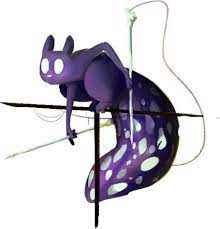
Spearmaster
Represents how Five Pebbles went slient for a long period of time, and also represents how at the time Five Pebbles was taking Looks to the Moon / Big Sister Moon's water. With no mouth this creature cannot speak, thus cutting it off from connections with it's kind. Along with that, the fact it has no mouth means it must parasitically suck food from others, like how Five Pebbles was sucking water from Moon.

Artificer depicts Five Pebbles violence towards Moon, and his rage towards all life in general. After the death of her children, this bombastic warrior started a genocide against the scavenger population. Now stuck in an cycle of violence due to her rage towards the scavengers she mirrors Five Pebbles and how he only made his situation worse by lasing out at others.
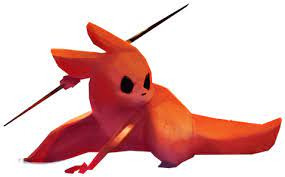
Hunter stands for the fact Five Pebbles still cares for Moon, and his the rot. With only 20 cycles (25 if you visit Five Pebbles) Hunter clearly has rot, as you can find its corspe in the Gourmand. And well...
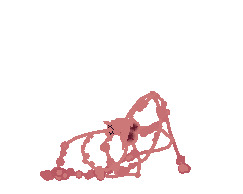
yeah. But also it mission is to deliver slag keys to Moon so she may create a few neuron flies for herself. And we can see the remorse Five Pebbles feels towards the situtation in Rivulets campaign. Thus early on the Hunter illustrates Five Pebbles' early regret towards what has happened to Moon, yet his inability to do anything about it. As even this creature can do little more than restore basic funcition, and short term memory storage to Moon's puppet.

Gourmand embodies Five Pebbles gultony with the water situation. As all Gourmand does before being told to take its people out of Five Pebbles' ground is consume food. It also is the only slugcat with a crafting mechanic, and Five Pebbles was trying to craft something to destroy him so he could ascend.


Survivor and Monk together represent Fiver Pebbles' relationship with Moon. As the slugcats are both siblings, they mirror how Five Pebbles and Moon see their relationship, especially due to how close their were built to one another.

The Rivulet epitomizes Five Pebbles hurried nature. Often when playing as Rivulet the player find themselves biting off more than they can chew due to the fast movement speed of the creature, they are invited to run into the unknown without thinking about the danger that might lurk ahead. Rivulet echos how Five Pebbles rushed to iterate the cells he need to ascend, but he put himself and Moon in danger instead.

Finally, Saint. It personifies the end Five Pebbles longed for. Ironically, it arrives when Five Pebbles can no longer recongizes what is it. Furthermore, Five Pebbles in his dulled mind is ready to recieve help, yet all the help he can now get is from Saint as he can no longer reach any other Iterator. Saint also brings Five Pebbes relationship with slugcats to its conculsion as they start as thing beneath him to Five Pebbles but overtime became his only means of interaction with Moon, Saint brings this to it logical end as now these creatures that Five Pebbles disliked is his only way of iteracting with the world outside of his music pearl, he finally wants to try to be kind to other beings, yet in his state all he can do is warn about the incoming worsing of the blizzard.
In all the slugcats have things that connect them with Five Pebbles, whether it be their own traits or their relationship to others. And I just think it isn't noticed enough :D/nm.
#Rain world#theory#slugcats#Five Pebbles theory#Slugccat theory#symbolism#rain world theory#All campaigns rain world#spoiler warning#spoiler: Rain World#spoilder: Rain World Downpour#rw spearmaster#rw artificer#rw gourmand#rw survivor#rw monk#rw rivulet#rw hunter#rw saint#rw five pebbles#rw looks to the moon#<- mentioned#mmmmm
25 notes
·
View notes
Text
Ruthless Representatives, Unjust Executions (1/3): the Death of an Artillery Captain
This is a response to @josefavomjaaga's recent post, which partially deals with the alleged arrest and execution of an artillery captain by Saint-Just, then a representative on mission, during the siege of Charleroi, and the representatives' abuse of military men around the time of the battle of Fleurus. Josefa enquired whether anyone could shed light on this incident from the FRev community. While I am not well-versed in FRev events, I would like to offer some of my findings about military justice in the army during the Revolution in relation to the representatives in three parts. The first part deals directly with the tale of Saint-Just's execution of the artillery captain, and how it was turned into a symbol that exemplifies the Revolution's extrajudicial violence. All translation errors are my own.
The source about Saint-Just's terrorisation and execution of the artillery captain that is cited the most is from Soult’s memoirs (1854). Writers, including Colonel Phipps, use this source verbatim without questioning it, because Saint-Just and all the representatives were obviously Stupid Civilians who thought that any incompletion of their orders amounted to betrayal:
It was above all the siege division which deployed with activity before Charleroi. The colonel Marescot directed the engineering operations, under the eyes of Generals Jourdan and Hatry; we had a sufficient artilery crew, and the representatives Saint-Just and Lebas stood at the foot of the trench to speed up the work. One day, they visited the site of a battery that had just been marked out: "At what time will it be finished?" asked Saint-Just of the captain responsible for having it executed. "That depends on the number of workers that I will be given; but we will work relentlessly," responded the officer. "If tomorrow, at six o'clock, she is not ready to fire, your head will fall off!..." In this short time, it was impossible for the work to be completed; even though as many men were put there as the space could contain. It was not entirely finished when the fatal hour struck; Saint-Just kept his horrible promise: the artillery captain was immediately arrested and sent to his death, because the scaffold marched in the wake of the ferocious representatives. (pp. 156-157)
Saint-Just, in Soult's depiction, is the proper Archangel of Death, guillotining everything that stands in his path. In portraying Saint-Just thus, Soult criticizes the representatives' murder of an innocent man. Worse, he depicts representatives as civilians that can only stand around instead of hardworking soldiers bringing the siege to fruition, making their commands unjustified. Soult condemns the fact that a civilian's word could be the injust law that separated soldiers from life or death.
That said, as Soult is no friend of the political figures of the Revolution, his remembered account requires precise corroboration to be valid. I found one earlier source that describes, presumably, the same incident, from Victoires, conquêtes, désastres, revers et guerres civiles des Français, de 1792 à 1815, vol. 3. It was written in 1817 by "a society of soldiers and men of letters", and edited by Charles Théodore Beauvais de Préau, a general of the Revolution and Empire. Though this anonymisation may have been taken to avoid the wrath of the Bourbons in the Restoration, it means we have no idea who wrote the following section, nor their intentions:
This fierce man [Saint-Just], who never showed himself in the trench, informed that a captain of the first regiment of artillery had been somewhat negligent in the construction of a battery of which he was in charge, had him shot in the trench. At the same time, he gave General Jourdan the order to arrest, and consequently have shot on the spot, the General Hatry, commander of the besieging troops, the General Bellemont, commander of the artillery, and the commander Marescot. The General Jourdan had, at the risk of his own life, the courage to resist the wishes of this gutless representative. The officers of whom we have just spoken of had the audacity of protesting against the cruel sentence which condemned the unfortunate artillery captain Méras, and, in his his atrocious delirium, Saint-Just dared to accuse them of complicity. (p. 47)
If we infer from the title of this source that the editor compiled the accounts of his comrades, then this account was written by a former Revolutionary and Imperial officer who could have some memory of the incident. However, many aspects of this text don’t line up with Soult’s account, including the way the captain was executed (shot in the trench here, guillotined in Soult's account). Saint-Just's successive condemnation of high-ranking officers, which highlights how much power he had over even the highest echelons of the army, also does not appear in Soult's account. But we do have a name for the captain: Méras. His name, in fact, appears in a 1797 publication: L'observateur impartial aux armées de la Moselle, des Ardennes, de Sambre et Meuse, et la Rhine et Moselle, a memoir by Pierre Charles Lecomte, at the time "the conducteur general of the artillery in the Army of the Rhin-Moselle [sic]". This is his account on the affair, relegated to a footnote:
Before giving the details of the capitulation of Charleroi, I must cite a horrible feature of the role of Representative Saint-Just. The French proconsul ordered the construction of a battery that he thought was necessary.* The general Bollemont [sic] entrusted its execution to an artillery captain, named Méras. All the shovels, pickaxes, and other utensils happened to be employed in other work, the orders of the Representative could not be executed. The morning of the next day, passing close to the location where the battery was supposed to be constructed, he [Saint-Just] shouted, raged, sent to search for the captain; and, without listening to his reasons, he had him arrested. Two days later, when his [Méras’] company was battling against the enemy, he [Saint-Just] had him taken from the prison, he had him conducted to the middle of his works; and there, o misery! o inhumanity! he had him assassinated. At night his company returned to the camp covered in glory; they learned that their chief had been shot; they surrendered to despair. They wanted to go to the tyrant: they were stopped, under the fear that some of these brave soldiers would have become new victims. Méras was so much loved, that all of the artillery wanted to enact vengeance on his assassin. This almost universal rumour made itself heard amongst the trenches; and, for preventing it from having consequences, the company of the unfortunate Méras was sent into the interior. *We know that there was a time when the Representatives, often little-instructed in the military arts, dared impudently to command old soldiers whose arms had dulled, and obliged them to sacrifice, according to their whims, some thousands of brave soldiers. (p. 38-39)
Once again, the details contradict even more with Soult’s account, and with that of the 1817 one. Soult says as much help as possible was given to the artillery captian, but Lecomte says all other workers were occupied and that captain received little help (presumably because the battery was militrarily unimportant). Méras’ misery is stretched out over two days instead of him being shot immediately, and it is not the generals who protested against Méras' execution that Saint-Just raises a hand against, but Méras' entire company, which the civilian government sends to the Vendée. The message could not be clearer: under "tyrannical representatives" like Saint-Just, the Revolution is eating its soldiers, the common people it was supposed to protect.
Is this the truth of the matter, since it is the earliest version? The publication is contemporary enough, but I am inclined to doubt the reliability of a text explicitly titled “impartial”. A look at the author's background reveals his attitudes. Lecomte was, according to BnF data, the maître de pension in Versailles until 1792 (presumably up to the abolishment of the monarchy), then the inspector of octroi taxes in Paris until 1815. Seeing that he served the First Empire, I am inclined to think that he was no die-hard revolutionary, and certainly not part of the Montagnard faction. Furthermore, he published his account after the fall of the Montagnards, during the height of the Directory. This makes the affair more likely to be Thermidorian propaganda, and indeed Lecomte even admits that his account was an “almost universal rumour”, not a fact, because in his story, no one is present at the scene of Méras’ death other than Saint-Just and his executioner. This makes the account unverifiable, and makes it more likely to be fabrication.
It would seem that, after Saint-Just’s death, the army’s fear and hatred of representatives turned into slander against their characters, often resulting in widely circulated variants of the same tale to emphasise different effects. The 1797 version highlights Saint-Just’s cruelties as a tyrant against the “small folk” of the Revolution and uses exclamatory language to amplify the reader's pathos. The 1817 version emphasises Saint-Just’s power over even the generals of the army, exaggerating his dictatorship. Finally, in Soult’s memoir, Saint-Just is not just a dictator who could dismiss soldiers with a wave of a hand. He and the representatives were synonymous with the guillotine and the excesses of the Revolution themselves.
The accounts of Saint-Just condemning Méras to death are inconsistent, and should amount to nothing more than invalid hearsay, which tells us nothing of the representatives' historical actions. If anyone has more information on the topic or the wider subject, feel free to add to this.
22 notes
·
View notes
Note
Did Robespierre, Danton, Desmoulins and Saint Just approve of the drowning of civilians including children in Nantes? It says on wikipedia that the National Convention approved if the extermination of the people of Nantes in 1793
Full disclaimer: I don't know enough about Vendée because it makes me sick to my stomach tbh (civil war is a trigger for me). So I never researched details of it, nor did I research Carrier and what happened in more detail. (And also full disclaimer: I have a strong dislike/fear of that man so I never wished to look more closely into it.)
What I do know is that the context of this was civil war (namely, brigandins taking arms against the Republic and Republic fighting back). However, I don't see how the list of victims in the Nantes drowning included brigandins (?) So Carrier (or whoever was responsible for it) definitely acted outside of the orders. I need to see what was said in 1793; I know of speech(es) Carrier did when he was recalled by Robespierre in early 1794, where he insisted on the need to fight and kill brigandins (those who take arms against the republic). That was supported by the Convention, I believe (even if fighters were women. For children, I don't know - by law, executing anyone under 16 was illegal and not endorsed (?) so I don't think that was supported? If anyone knows better, please let us know). But there was no talk of exterminating the general population, and that was not approved (again, as far as I understand). And what happened in Nantes went beyond that, and into general population. So that was a big problem.
As I understand, Carrier was denounced for his behaviour - I know that the young Marc-Antoine Jullien (he was 18-19 at the time) was Robespierre's spy and he reported on Carrier's behaviour, which made Robespierre recall Carrier (and also Carrier asked to be recalled? No idea what happened there).
As who enabled Carrier... None of the names you mention in your post were Carrier's allies (and Robespierre was his big opponent*). But this whole thing does bring up a bigger problem in frev, that is, the vague/unclear orders AND lack of proper centralized control. In short: the representatives on mission had way, way too much power that was not fully and strictly defined and limited. So they could do many things that were not exactly ordered by the Committee of Public Safety or the Convention... but that were not illegal, either (because they were given all that power and were allowed to do measures as they saw fit. It was assumed that they would do it fairly and without war crimes but eeeh. It was a naive assumption). There was a good post around here that went something like "there is a representative on a mission coming to your area. Will he make things better? Will he do war crimes? You never know."
So yes, a lot depended on the individuals in charge, and there was no effective way for Paris to control their behaviour (which is one of the reasons why the Republic in Year II could not be called a strong centralized state, no way). Paris relied on reports from the representatives (who obviously made themselves sound great), spies and general population, and it was often "this guy's word against that guy's word". They had no fast method of communication, no photographs, no reliable ways to tell wtf was going on). It is not an excuse (I do think not strictly defining and limiting representatives' power was a huge problem). So this is how we got the situation to have CSP/Convention say "fight harshly those who take arms against the Republic" and then going surprise Pikachu face when hearing about war crimes. (News flash: you can't just give all that power to people and leave it to their consciousness without imposing some limits). I do think many were honestly shocked/appalled at what happened, but my dudes, you carry your share of responsibility for not defining what's allowed and what's not. (That, and I also the Convention did want to destroy soldiers/fighters/brigandins fighting against the Republic and win the civil war, just like it wanted to destroy the enemy armies and win the war with the foreign armies. So while general population was not supposed to be targeted, representatives often used "those people were actually brigandins" as an excuse).
*Carrier and Robespierre loathed each other and wanted each other dead (so Carrier won at that, at least briefly), but I am not sure what was the exact reason for their mutual hate and what were the reasons for their disagreements. (I assume, like with Collot and Fouché, war crimes might have played a role, but I also feel - just like with Collot and Fouché - there were probably other reasons. So I am not claiming that Robespierre wanted Carrier dead (just) for what he did in Nantes).
So that's all I know, I am afraid. Anyone else?
29 notes
·
View notes
Text
Examples of some games that use each style are below for anyone who is curious (most of them are first-person shooters, and all but one of them are combat-focused).
"NES-style but with larger sprites that aren't tile-based" - Literally any modern game that's trying to look like something on the NES
"Quake-inspired low-poly 3D but with interpolated skeletal animation" - DUSK, ULTRAKILL
"Prerendered sprites but with normal and specular mapping so they look 3D" - Brigador, Nightmare Reaper, Amid Evil (only on the weapons)
"Mid-poly 3D with low-res textures" - System Shock (2023), Turbo Overkill
"Mid-to-high-poly 3D with a low-res pixel-filter slapped on top" - The Magic Circle (only on a few areas and NPCs), Saints Row IV (during one specific mission fairly late into the game, and maybe a few other places)
"'2.5D' (3D levels, 2D characters) with HD sprites." - Fallen Aces
"Something else" - Fashion Police Squad (has the look and stuff, but the cultural references, non-gameplay images, and squash-and-stretch animation style all look a bit too modern), Prodeus (literally everything except for the levels themselves is represented with high-res prerendered graphics, though I think there's also a toggle to turn on models for everything instead?)
Cruelty Squad (simultaneous gore, eyestrain, sensory-overload and epilepsy warnings for not just the game but also screenshots and trailers, like seriously it's so bad that the Steam page has a warning at the beginning of the "About This Game" section)
Also, for two games that pull off their respective "retro" visual styles in really authentic-feeling ways, check out HROT (inspired by Chasm: The Rift and Quake, and feels like a real – if extremely strange – FPS from that era) and Zortch (which looks and feels like a weird N64 FPS from the late '90s, but came out almost exactly a year ago at time of writing).
14 notes
·
View notes
Text
"Home" is North o’clock
Through this entire first season on TWDDD we’ve seen Daryl on a mission to find a way to get back home. He’s been desperately searching for a functioning radio in every episode, and has managed to stay laser focused on traveling north, to find a way home. Despite constantly getting sidetracked along the way, he’s now nearing Le Havre, where the people of Union of Hope have promised to help him find a ship to America.
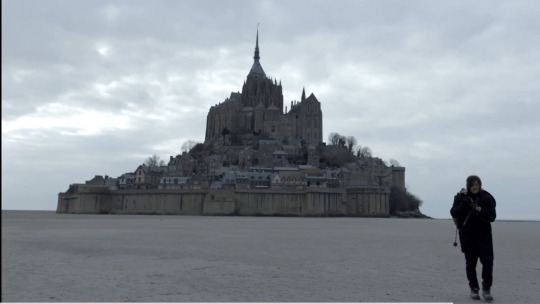
In TWDDD 1x5 Deux Amours we see Daryl, Laurent and Azlan make their way up the river, heading north, to The Nest. We get to know Azlan, whose story involves a tragic loss which took away his reason to live.
We also heard how a clock represented a turning point for him. It saved his life, he explains, and gave him a purpose to live. I took one look at that clock and realized it was the French equivalent to Beth’s DC spoon from 4x12 Still.
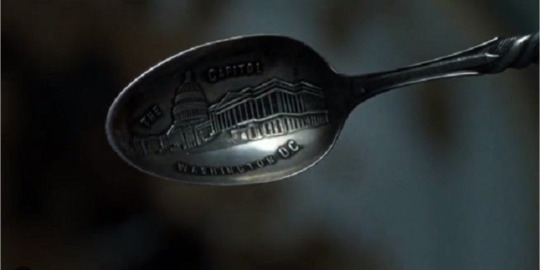
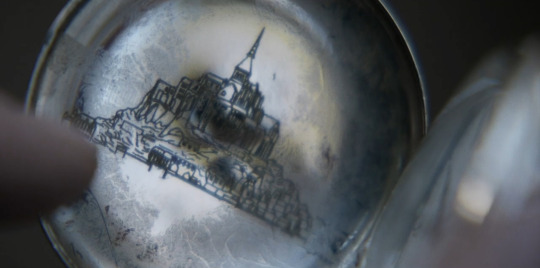
I’ve written a lot about the intersection between Sirius symbolism and North Star symbolism (here and here), and once again, in TWDDD Deux Amours, we see a representation of how “north” represents “home”.
In TWD season 5 we saw it explained by Carl to Judith; that if you’re lost at night, just find the North Star, it’s at the end of the Little Dipper:
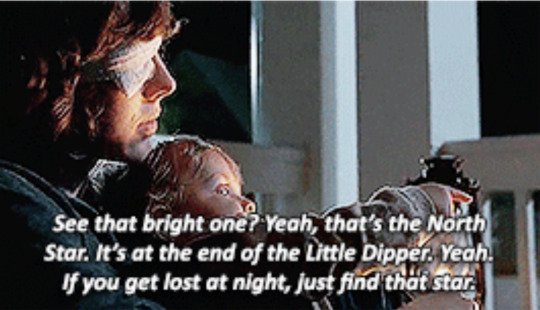
Of course we all remember Beth picking up the DC spoon/Little Dipper in Still…
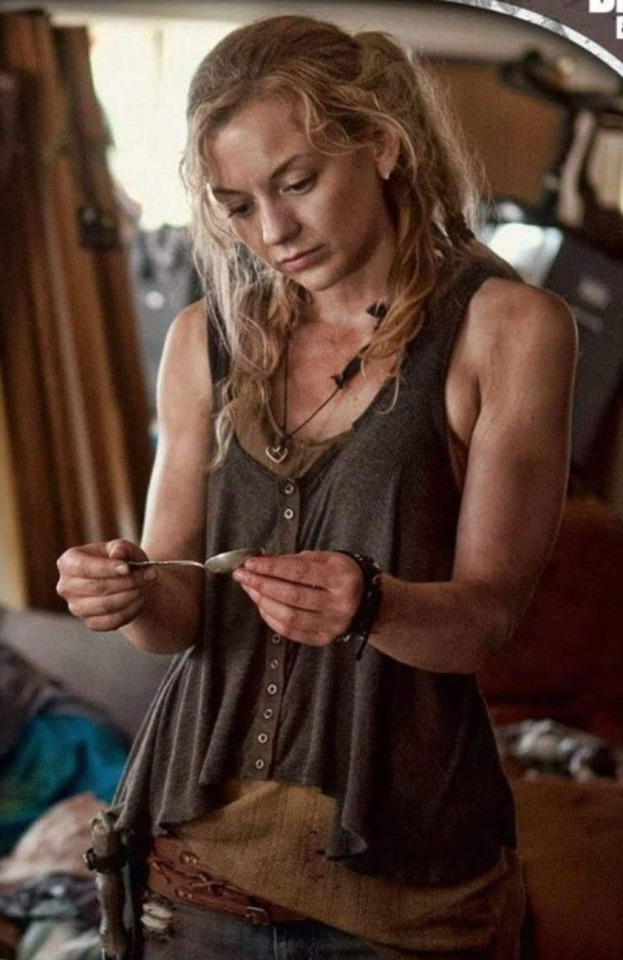
Daryls entire time in France has revolved around traveling north, to the place called The Nest, where he’ll deliver Laurent and get a ticket to a trans-Atlantic cruise in return.
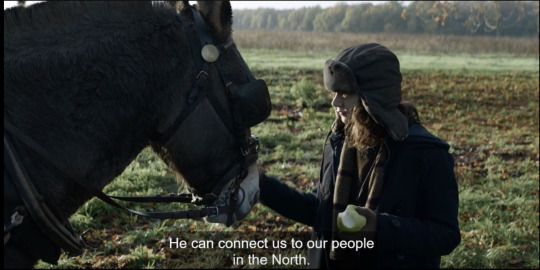
When Azlan dies he gives the clock to Daryl, tells him to follow the river north, until they arrive at the place depicted on the clock, The Nest (which in reality is Mont Saint Michel). When Genet’s people catch up to Daryl and Laurent, Daryl gives the clock to Laurent and instructs him to follow the river until he sees The Nest.
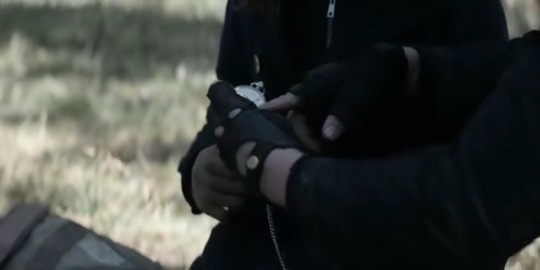
So the navigational themes are strong around both the clock and Beth’s DC spoon. The DC spoon for obvious reasons; the North Star is at the end of the Little Dipper, as Carl explained. The North Star will help you find your way, it’s a compass in the sky.
Azlan’s clock on the other hand, is pretty much a regular compass, in that clocks can be used as compasses. I’m not making that up, a clock can be used as a compass. That is an actual thing that people do.
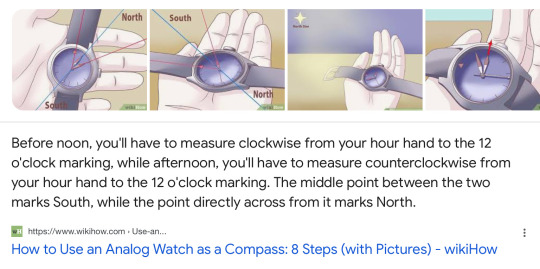
Basically, what we’re seeing here is that Azlan’s clock is synonymous with Beth’s DC spoon.
And remember how all of Daryl’s efforts of getting to the north involves constantly searching for functioning radios? He’s been talking about radios non stop since he washed ashore in Marseille.
Well, in 1x5 we finally saw him get a hold of a radio. It was in a flashback from right before he was taken aboard the French Research Vessel of Horror, where we also saw a character randomly named Grady!?!???
Totally side-eying that, particularly because we also met another dude named Juno, which @wdway brilliantly recognized as a reference to the Alaska state capital Juneau! Which, again, ties right into the north symbolism because of this license plate from 5x16 Conquer:
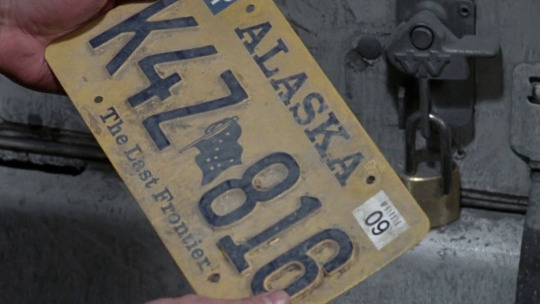
That’s the Big Dipper and Polaris (North Star) there on the Alaska state flag!
And remember how I in this post from last week talked about how tptb sometimes uses silly word plays as symbolism? Words and phrases that phonetically sound similar? Like serious/Sirius, beer/bear, Monet/money and the classic Del Arno Foods/"there are no foods"… (which was interestingly also taken from 5x16 Conquer, where we saw the Wolves luring walkers into trailer trucks, in a perfect parallel to what we saw in Daryl’s flashback from Maine,..)
Yeah, speaking of phonetical similarities...
In TWD 10x17 Home Sweet Home we heard Beth's name for the first time in a very long time...
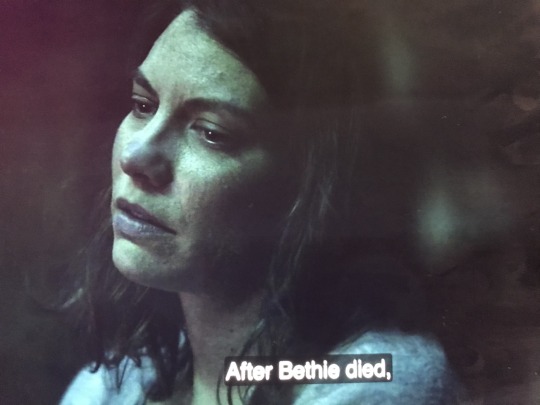
Maggie has no reason to believe that Beth isn't dead so I wouldnt worry about that part. What's interesting is what she's calling her sister; Bethie!
If I was ever instructed to find a name that phonetically sounds like Bethie...
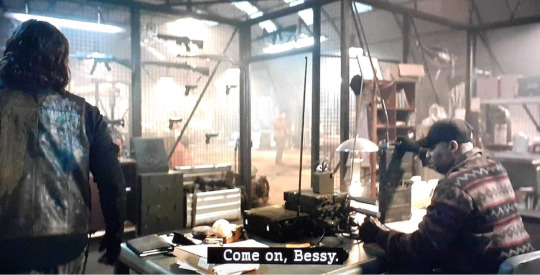
...Bessy sure as hell would be among my top contenders...
Bessy, as in the name the radio operator has assigned to his radio...
I have talked about how radios are Sirius symbolism, right? (that's a rhetorical question, I have talked about it ad nauseum)
And I think I have explained that Sirius means "return/resurrection/coming back" a couple of times as well...
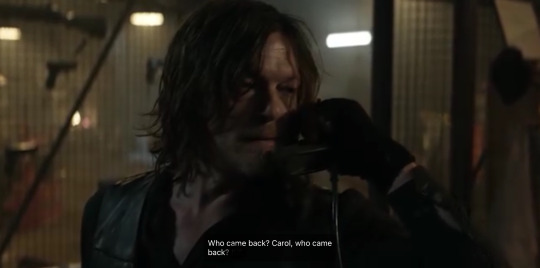
Bessie the Radio sure seems to be well tuned into the symbolism around "returns" and people "coming back"...
You’re free to do with that as you please...👀
#bethyl#daryl dixon#beth greene#team delusional#team defiance#beth x daryl#the walking dead#twd#twddd#home#north star#beth’s dc spoon#the nest
29 notes
·
View notes